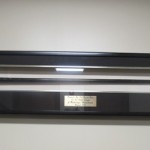A close up of Maynard’s Boston Cane
Photo/submitted
By Michelle Murdock, Contributing Writer
In 1909, in an effort to gain additional publicity for his popular daily newspaper the Boston Post, owner and publisher Edwin Grozier distributed gold tipped ebony canes to selectmen in 700 New England towns with the request that the canes be presented to the towns’ oldest male residents. The idea was that when the holder of the cane passed away, it would then go to the next oldest resident. Originally only presented to males, the custom was expanded to include women in 1930.
The canes were all made by J.F. Fradley and Co., a New York manufacturer, from ebony shipped in seven-foot lengths from the Congo in Africa. They were cut to cane lengths, seasoned for six months, turned on lathes to the right thickness, coated and polished. They had a 14-carat gold head two inches long, decorated by hand, and a ferruled tip.
In many towns over the years, the original canes have been lost or misplaced, but some recent finds are allowing the tradition of the Boston Post Cane to continue.
In March of 2015, the original cane of Burlington, Mass. was found in the storage area of the Burlington Historical Society. Town Clerk Amy Warfield said the cane had been in the Town Clerk’s possession until Town Hall was renovated in 1995 when it was given to the historical society for safe keeping. On March 23, 2015 a replica of the cane was presented by the Board of Selectmen to 101- year old Regina Short, Burlington’s oldest resident. A video of the presentation is available on the Burlington Cable Access website.
In some towns like Hopkinton, Mass., where the original cane was once lost, a replica cane is now awarded and the original is preserved. Hopkinton’s original cane is now displayed in the lobby at the town’s senior center and a duplicate cane is presented to the town’s oldest resident.
A similar tradition has evolved in Holden, Mass. where the oldest resident is awarded a miniature version of the cane while the original sits in the Holden Senior Center.
By chance and without really planning to become the repository of information about the Boston Post Canes that were distributed throughout Maine, Massachusetts, New Hampshire and Rhode Island, is the community website of Maynard, Mass. at web.maynard.ma.us. According to the site’s publisher, David Griffin, the website is one of the oldest on the web, started in 1995.
“Back in 1995, the web was primarily an engineering playground,” said Griffin when contacted by email. “I’m one of them.”
As detailed on the website, Griffin explains that in 1985 Ralph Sheridan, the historian for the town of Maynard, wrote a story about the Boston Post Cane and later, when Griffin was creating his website, he reproduced Ralph’s article.
“People started sending emails,” said Griffin. “Repeat for 20 years….voila!”
According to information collected on http://web.maynard.ma.us/bostonpostcane/, updates on over 2/3 of the original 700 canes have been received and compiled with a total of 478 of the original canes accounted for. As of mid-September, the website reports the following: 204 updates from towns in Maine, 148 updates from towns in Massachusetts, 108 updates from towns in New Hampshire, and 18 updates from towns in Rhode Island.
“With check-ins from 478 towns, we are now past the 2/3 mark (68 percent to finding what’s happening with all of the canes,” reads an update on the website. “We appreciate everyone’s contributions.”
When asked about the most interesting story about a Boston Post Cane that he had come across, Griffin said that he wasn’t sure if anything really stands out, but in 2008, he received an email from a man, Steven Fradley, asking if there was a list of the 700 towns, a common request.
“I replied ‘no,’” said Griffin, “but asked Fradley if he was a relative of J.F. Fradley, the maker of the canes. Indeed, he was the great grandson of Mr. Fradley, spending most of his life in New England completely unaware of his family’s contribution to this. That was cool.”

Photo/Bonnie Adams












